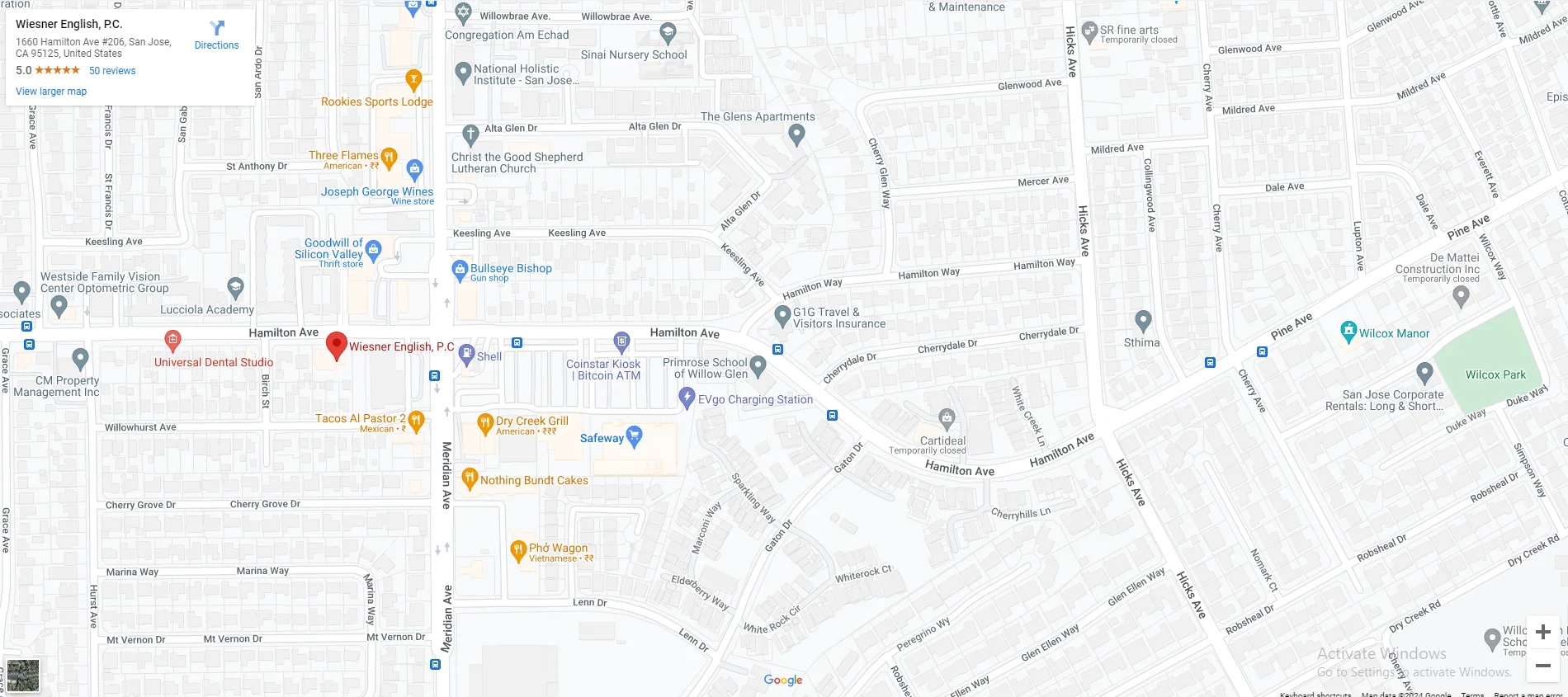San Jose Repetitive Motion Injury Lawyer

San Jose Repetitive Motion Injury Attorney
Repetitive motion injuries (RMIs) are chronic ailments that are caused by completing work tasks. They can be extremely debilitating for working individuals, limiting their ability to perform work tasks and live satisfying lives. Usually, these injuries occur gradually as a result of sustained strong movements, mechanical compression, extreme or awkward bodily positions, or repetitive work. A San Jose repetitive motion injury lawyer can help you pursue the worker’s compensation claim.
Typical cases of repetitive motion injuries include tendinitis, bursitis, and carpal tunnel syndrome. Workers in a variety of industries, including technology, healthcare, manufacturing, and construction, are especially vulnerable to these kinds of injuries. Knowing your choices for compensation and your rights if you or a loved one has developed an RMI because of your job is essential.
About Wiesner English, P.C.
Fighting for the rights of injured workers in San Jose has been the focus of Wiesner English, P.C.’s attorneys throughout the entirety of our firm. Numerous industries, including manufacturing, government, construction, licensed professionals, restaurants, service industries, and small enterprises, have benefited from the assistance of our team.
We strive hard to defend each client’s rights because we recognize the stress that workers’ compensation disputes can bring. Our promise is to offer individualized legal assistance, making sure that every case gets the consideration and focus it requires.
Recognizing Injuries from Repetitive Motion in San Jose
Over time, repeating the same motion can lead to repetitive motion injury, which is caused by wear and tear on the muscles, tendons, and nerves. If treatment is not received, this kind of injury may result in chronic pain, decreased mobility, and perhaps even irreversible damage.
RMIs are more common in jobs involving repetitive tasks like typing, assembly line work, and physical labor. Early symptom recognition and obtaining medical attention can assist in controlling the injury and implementing mitigation strategies into your daily schedule.
Steps to Take if You Suspect You Have an RMI
If you suspect a repetitive motion injury, it is crucial to take the following steps to ensure proper documentation and support for your claim. These steps include:
- Report the Injury: As soon as you get hurt, let your employer know. There are rigorous deadlines in most jurisdictions for reporting occupational injuries, and not reporting them on time could make your claim less likely to succeed.
- Seek Medical Attention: See a physician who can identify and record your problem. Attend all follow-up appointments and adhere to their treatment plan.
- Record Everything: Preserve a thorough record of your symptoms, doctor appointments, prescribed medications, and correspondence with your employer on your injury.
- Speak with a Lawyer: To assist you with navigating the claims procedure, think about consulting with a workers’ compensation lawyer.
Preventing Repetitive Motion Injuries
As RMIs can have such a drastic effect on workers’ lives, it is imperative that employers do everything they can to prevent them. Ergonomic assessments should be conducted to identify potential hazards, and the workplace and tools should be redesigned to reduce the risk of RMI, such as using specialized furniture, like anti-fatigue mats, adjustable workstations, and task lighting.
Regular breaks can also help to minimize the effects of RMIs by reducing any sustained stress on a specific group of muscles. Job rotation can provide the same benefits. Employers should also train their workers in correct techniques and explain how to work with good posture and use their equipment properly.
Why Choose Wiesner English, P.C. in San Jose, CA?
Your workers’ compensation claim outcome may vary significantly depending on the attorney you choose. The well-being of our clients is our top priority at Wiesner English, P.C., and we put in endless effort to get them the money they are due.
Our company is aware of the difficulties associated with repetitive motion injuries and how they may affect both your personal and professional life. Our goal is to assist wounded workers in their healing process by offering them individualized care and extensive legal support.
FAQs About San Jose, CA Repetitive Motion Injury Laws
Can I Claim Compensation for Repetitive Strain Injury?
Yes, you can make a claim for an injury that is repetitive in nature. Workers’ compensation pays claims when an injury is work-related and arises out of and in the course of employment. This includes injuries sustained due to repetitive motions. In making your claim, you must report your injury to your employer as soon as you become aware of it and seek medical attention.
How Do I Prove a Repetitive Strain Injury?
It is necessary to show a clear connection between your work-related activities and the repetitive stress injury you sustained. This usually requires thorough medical documents from a doctor detailing the injury’s diagnosis, course of treatment, and a professional opinion connecting the injury to repetitive work demands. It’s also important to record your job responsibilities and any modifications you make to them that might have affected the injury.
Does Workers’ Comp Cover Repetitive Stress Injuries?
Yes, injuries caused by repetitive stress are usually covered by workers’ compensation. Workers’ compensation may cover costs for medical care, missed income, and rehabilitation after your injury is recorded and confirmed to be related to your job.
However, obtaining workers’ compensation for a repetitive motion injury (RMI) can be difficult and frequently requires providing thorough documentation of the injury’s connection to your employment.
Is a Repetitive Stress Injury a Work-Related Injury?
Yes, if they are sustained through the repetitive tasks and movements required by your job, then repetitive strain injuries can be classified as occupational or work-related. Jobs that involve repetitive arm, hand, and finger movements, forceful exertions, or awkward positions have higher incidences of RSI than others. Early intervention can prevent the condition from worsening and support your claim for workers’ compensation benefits.
Hire a San Jose Repetitive Motion Injury Lawyer
Contact Wiesner English, P.C. today if you or a loved one has sustained a repetitive motion injury at work. Our staff is prepared to hear about your experience, offer knowledgeable legal counsel, and help you navigate the workers’ compensation system. Contact us to make sure your rights are upheld and to receive the assistance you require so that an injury won’t determine your future.
Request A
Free Consultation
Fields marked with an * are required





